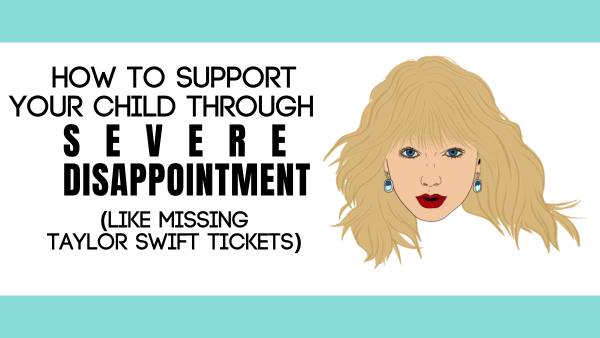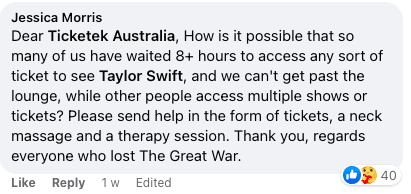
“Your turn to purchase tickets is coming soon.”
Ten minutes in to the Taylor Swift presale, and I found that phrase hopeful. I knew thousands of people around the country were trying to access tickets to the celebrity’s global tour – her first since COVID-19. But short of a missed chance to see One Direction a decade ago, I’ve never had trouble accessing tickets before, especially if I was content with the cheapest on offer.
An hour later, and that hopefulness turned to disillusionment. And after more than 8 hours staying in line over the course of the week, I was a little less, shall we say….happy. So I messaged the ticket provider about situation.

Look, was I over reacting? Maybe. But the fact was, I had to do something with my disappointment. And as long as I was being respectful, it felt like a safe outlet.
After a few hours, I calmed down and my disappointment waned. As a 33 year old, I resigned myself to the fact I will be experience severe FOMO (Fear of missing out) in February and need to practice self care accordingly. It’s worth noting that I did throw my back out from the constant bouncing between screens while I was trying to access tickets, but aside from that, I weathered the worse of the Taylor Swift Great War.
Surviving crushing disappointment
Lots of other people didn’t. Especially people younger than me. In group chats I saw people fold in on themselves. They were angry, or devastated, or confused. People would lash out at those who accessed tickets (especially multiple tickets), all the while people who were lucky enough to get tickets spent thousands of dollars just to get a seat in a stadium. It was a mess, and peoples lives (in that moment) were in tatters.
Enter the parents, caregivers, adults and non-Taylor Swift fans.
To a lot of people, this reaction was deemed an over-reaction. Experiencing anger and depression due to concert tickets seemed far fetched; let alone spending thousands of dollars to be in the same stadium as a celebrity who would likely never know your name! But this logic isn’t logical to the hardcore fan – especially a young fan, who finds their identity and place in the world through a celebrity.
Do you know young people who didn’t get Taylor Swift tickets? Or maybe you’ve seen this sort of reaction from people you love about events that seem trivial to you. Before you start griping and telling them to “get over it,” take a pause. Because what they are experiencing is a lot deeper than you expect. They feel like they have lost part of their identity. Why? Because that celebrity, music, hobby or community helps them to make sense of the world.
The human brain doesn’t finish developing until the age of 25. All the while, we spend our teenager years trying to figure out who we are. For many pre-teens, teenagers and young adults, an obsession is a building block towards their identity. As they mature, they realise they are separate to the celebrity. And this means their emotions and stability aren’t reliant on that person, or what they are creating. But in the meantime, the sense of urgency and connection they feel towards that celebrity or hobby is intense, because life is intense.
Missing a concert ticket, a chance to meet a celebrity, a piece of merchandise, or an exclusive release, therefore feels like the end of their world. And when it does inevitably happen, they build resilience. But how do you best support them in the fall out? Next time your child gets distressed over a situation that doesn’t make sense to you, remember these things:
-
This is not about you, so don’t take their anger, anxiety or moodiness personally.
Even if they say this is your fault, it’s not. Sadly, you cannot control the ticket provider or justify a second mortgage for Taylor Swift tickets.
-
Show empathy, but don’t baby them.
They need to know you see and understand their pain but will only grow if you give them space to grieve and mature from this.
-
Invite them to talk about their feelings.
Even if you don’t want to hear about Taylor Swift’s latest re-release where she sings about having her heart broken as a 19-year-old, they want to talk about it. Let them.
-
Ask them about their plans for the future and make some with them.
Perhaps there is a chance for re-sale tickets, or you can do something fun the day of the concert. Give them something to look forward too.
-
If they are struggling to find hope, ask them if they have any thoughts about harming themselves.
While this may seem like an over-reaction to you, they feel like their world is crumbling down. Check to see if they need to be observed for a while, encourage them to self soothe, and if you believe they are in crisis, call 000.
-
Remember, this will pass.
This disappointment is heart breaking, and your child’s response is like an emotional whirlpool that takes over your life. But remember, this is short lived. Your child will feel and process this event, and then you will all recover. Their celebrity obsession may last for another month, a decade, or be life long. But it will adapt and transform as they mature. This moment is just a pit stop along the way.
Are you raising children? Do they experience big emotions due to their obsession with a celebrity, hobby or game? Contact Rachel on 0422177193.